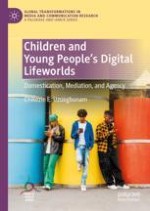2024 | OriginalPaper | Buchkapitel
7. Media Proclivities, Preferences, and Perceptions of Digital Technology
verfasst von : Chikezie E. Uzuegbunam
Erschienen in: Children and Young People’s Digital Lifeworlds
Aktivieren Sie unsere intelligente Suche, um passende Fachinhalte oder Patente zu finden.
Wählen Sie Textabschnitte aus um mit Künstlicher Intelligenz passenden Patente zu finden. powered by
Markieren Sie Textabschnitte, um KI-gestützt weitere passende Inhalte zu finden. powered by
